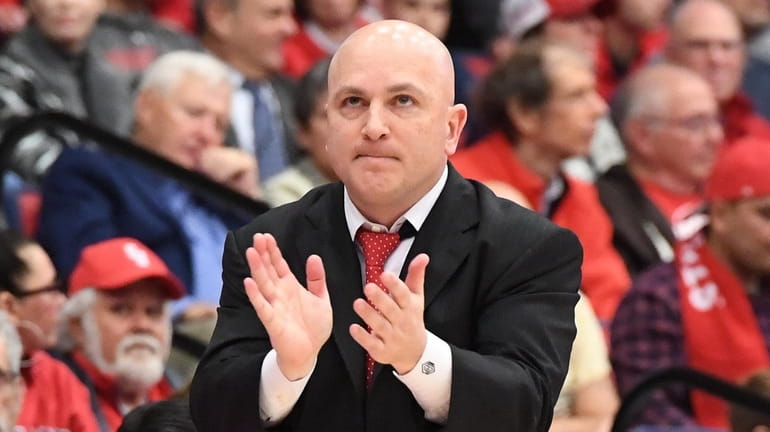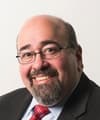College basketball trying to make safety the priority during COVID-19 pandemic

Stony Brook head coach Geno Ford reacts in the second half of an America East men's basketball semifinal against Hartford at Island Federal Arena on Tuesday, March 10, 2020. Credit: Kathleen Malone-Van Dyke
College basketball’s opening night comes Wednesday and already approximately 20 scheduled games have been postponed or cancelled. Dozens of programs have been or are paused because some member of the team, coaching staff or support staff have gotten a positive on a COVID-19 test.
The Ivy League will not even try to play this season. And the campaign’s big finale — the NCAA Tournament — is going to be played entirely in Indianapolis.
Nothing is going to be normal about playing a season during the coronavirus pandemic. Teams will constantly face the uncertain and be asked to adapt to change quickly. Little will be simple.
"There is no question that what we are seeing now is how it’s going to be," St. John’s athletic director Mike Cragg said. "There will be uncertainty on a day-to-day basis as well as cancellations and postponements. That’s the mark of COVID-19. Everyone is determined to get through this season and it’s going to take a lot of thinking, science and medicine."
St. John’s and the Big East — now at 11 teams with the addition of Connecticut – has only announced a schedule through Christmas and is contemplating everything from playing its normal round robin home-and-home schedule to bringing several members together in a single location — a so-called ‘bubble’ — to get through the entirety of its season.
Hofstra and the Colonial Athletic Association have cut league travel in half and now will play conference foes on consecutive days in a single location. Stony Brook and the America East Conference are doing the same. And the Pride and Seawolves are playing a largely regional non-conference schedule to reduce the health and safety concerns involved with playing road games.
"You hope for a season that will be close to normal, but there are going to be a ton of changes," Stony Brook coach Geno Ford said. "We’ve been vigilant about how we handle ourselves and we’ve been fortunate to have no one test positive so far. But every game has an opponent and you have to hope they are being vigilant, too."
The NCAA’s guidance falls in line with CDC. recommendations and suggests pausing a program for 14 days when there is a positive test of a Tier I member (players, coaches or support staff).
A stoppage like that could actually last more than just the two weeks as teams will want to ramp back up after such a stretch with no practices. Jumping right back into games after a pause not only puts a team at a competitive disadvantage, but also could open the door to more injuries.
Baylor head coach Scott Drew tested positive last Sunday and caused the first three games of its season to be cancelled, including Seton Hall on Sunday. There were reports that Baylor had wanted to start the season anyway.
"We will see this over and over again: one school’s doctors don’t agree with the other school’s doctors," Cragg said. "Everyone has to make the decisions that are best —meaning safest — for their program. But there is no doubt that we are seeing a fraying of medical trust."
Mike Farrelly, Hofstra’s interim head coach while Joe Mihalich is on medical leave, believes that the way most schools changed their academic calendars — ending semesters at the Thanksgiving break — could be a boon for the season.
"Students will go home and the campuses will be relatively empty for weeks," he said. "There are going to be fewer contacts for the players. That said, our guys have been doing their part to follow guidelines. We lost out on something last season when we didn’t get to play in the NCAA Tournament. None of our players want to lose out on anything else."
St. John’s coach Mike Anderson said that on a daily basis he reminds the Red Storm players to follow health and safety protocols by telling them "protect this team." He added "we’re taking day-by-day and the kids are doing the right thing."
With infections going up all across the country, the goal for all of college basketball is reach the end of the season without it being halted again by the pandemic. The NCAA’s move to hold its entire championship tournament in Indianapolis was made with that in mind.
"The vision for a successful season is for people to stay healthy and safe and compete for championships," Cragg said. "The end of the season is when that happens and the NCAA’s decision seeks to assure it."

